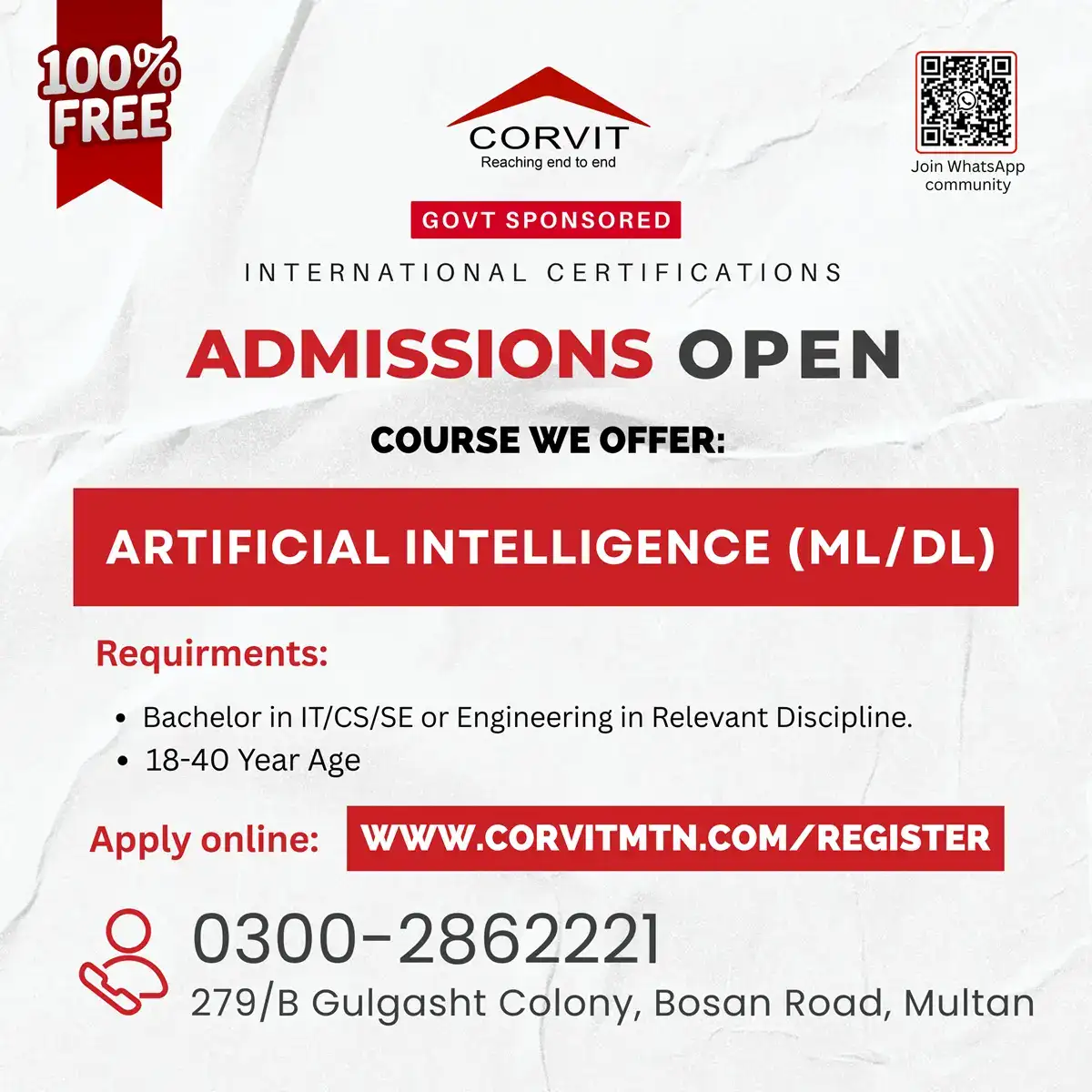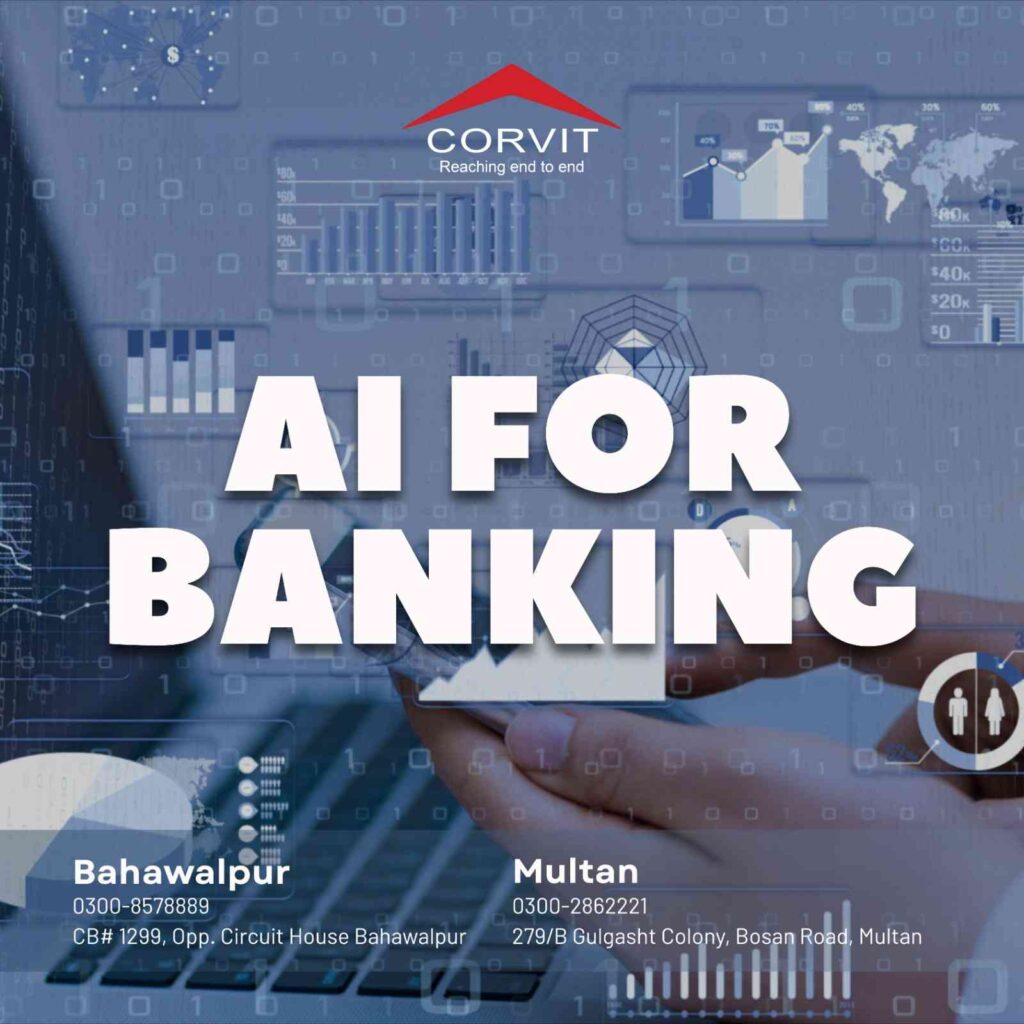Phone: +92 300 2862221 Email: corvitmultan@gmail.com


The banking industry is undergoing its biggest transformation in a century. Customers today expect instant, personalized, and highly secure digital services available 24/7. How are banks meeting these demands? The answer is Artificial Intelligence (AI).
AI is the engine driving the modern financial world, moving banks from traditional institutions into intelligent, data-driven powerhouses. For tech enthusiasts and finance professionals in Multan, this isn’t just a trend—it’s the single biggest opportunity to build a future-proof, high-impact career. This guide explores how AI is reshaping banking and what skills you need to become a leader in this new era.
Banks are adopting AI for three critical reasons that give them a massive competitive advantage:
Hyper-Personalized Customer Experience: AI algorithms can analyze a customer’s transaction history to offer personalized financial advice, relevant loan products, and tailored investment opportunities, making the customer feel valued and understood.
Iron-Clad Security and Risk Management: AI’s greatest strength is its ability to see patterns invisible to the human eye. This is a game-changer for preventing fraud and managing risk.
Unprecedented Operational Efficiency: AI can automate thousands of repetitive, manual tasks—from data entry to customer support—freeing up human employees to focus on more strategic, high-value work.
AI isn’t a futuristic concept; it’s already running behind the scenes in the banking services you use every day.
Real-Time Fraud Detection: Think of AI as a super-smart detective that monitors millions of transactions per second. It can instantly detect unusual spending patterns—like a card being used in two different countries at once—and flag the transaction or block the card before significant damage is done.
Smarter Loan Decisions: Traditionally, loan approvals could take weeks. Today, Machine Learning models can analyze thousands of data points about an applicant in seconds to assess their creditworthiness, leading to faster, fairer, and more accurate lending decisions.
24/7 Customer Support with Chatbots: AI-powered chatbots can handle thousands of customer queries simultaneously, answering common questions about account balances, transaction history, or branch locations instantly, at any time of day.
Algorithmic Trading: In investment banking, AI algorithms analyze market data to execute trades at the most optimal moments, a task impossible for a human to perform at the same speed and scale.
The banker of the future is not just a finance expert; they are a “T-shaped” professional. They have deep expertise in finance (the vertical bar of the “T”) and a broad understanding of technology (the horizontal bar). The most critical tech skills for the modern financial industry are:
Data Analysis: The ability to read, interpret, and derive insights from financial data.
Machine Learning Concepts: Understanding how predictive models are built and what they can do for the business.
Python Programming: The undisputed language of Data Science and AI, used for everything from data analysis to building complex machine learning models.
You don’t need a separate “AI for Banking” degree. The path to a career in this exciting field is by building a strong, practical foundation in core AI and Data Science technologies.
A Practical, Foundational Approach: Our courses, such as Python for Data Science and AI and AI (ML/DL), provide the exact technical skills that the financial industry is desperately looking for.
Solving Real-World Problems: The techniques you learn—like building predictive models or analyzing datasets—are directly applicable to banking challenges like fraud detection, customer segmentation, and risk analysis.
Learn from Industry Practitioners: Our instructors are professionals who understand not just the code, but how it’s applied to solve real business problems, giving you a crucial advantage.
Build a Future-Proof Skillset: We provide the training that will keep you relevant and highly valuable as the lines between finance and technology continue to blur.
The fusion of AI and banking is creating entirely new career paths and opportunities. By equipping yourself with the right tech skills, you can move from being an employee in the finance industry to becoming a leader who shapes its future.
Ready to position yourself at the forefront of the FinTech revolution? Enroll in our AI and Data Science courses at Corvit Systems Multan today!
Here are answers to some common questions we receive at our Multan institute.
Not necessarily. You don’t need to become a deep-level coder, but understanding the fundamentals of Python, data analysis, and what machine learning can do will allow you to work effectively with technical teams and make better strategic decisions. It makes you a more valuable manager and leader.
AI is changing banking jobs, not just eliminating them. While it will automate repetitive, manual tasks, it is creating a huge demand for new roles that require a blend of financial knowledge and tech skills. Those who adapt will thrive.
FinTech, or Financial Technology, is a broad term for any technology used to improve or automate financial services. AI in banking is a major part of the FinTech landscape.
No. Many tech professionals with strong AI skills are hired by banks and trained on the specific financial domain knowledge they need. A strong technical foundation is the most important prerequisite.



Copyright © 2025 – Corvit Systems Multan (Pvt) Ltd. All rights reserved.
